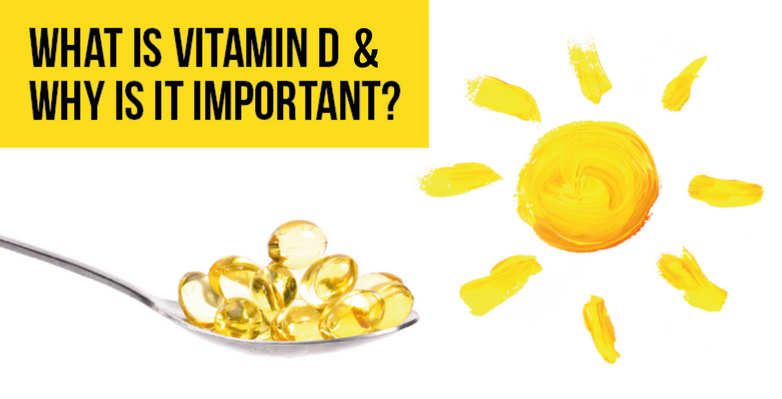You have no items in your shopping cart.
0item(s)
You have no items in your shopping cart.

What is Vitamin D?
Vitamin D is an essential micronutrient, this means our bodies are unable to produce it and its intake from food and sunlight is vital. Along with vitamin A, E & K, Vitamin D is fat soluble rather than water soluble like B-Vitamins & Vitamin C. The benefit of being fat soluble is that the body is able to store it within the liver and fat stores. This means that Vitamin D or 'the sunshine vitamin' stores can be built up and therefore a daily intake isn’t necessary.
Why is Vitamin D important?
Vitamin D plays an important role within the body, contributing to a range of bodily function and processes including:
- Bone Health: Vitamin D contributes to the maintenance of normal bones.
- Absorption: Vitamin D contributes to normal absorption/utilisation of calcium and phosphorus.
- Muscle function: Vitamin D contributes to the maintenance of normal muscle function.
- Immune Function: Vitamin D contributes to the normal function of the immune system.
What are the best sources of Vitamin D?
Vitamin D is produced in the skin when exposed to the ultra violet rays in sunlight and it can also be obtained through the diet.
Sunlight - Between late March/early April and September, sunlight tends is the best source of Vitamin D. However, there is no general guideline for how much sunlight we need in order to produce enough Vitamin D, as there are too many factors and individual differences which have an impact. It is therefore difficult to ensure we are getting enough sunlight to fulfil our Vitamin D requirements without having excessive exposure which causes skin damage.
Diet - From October to March the amount of vitamin D attained from sunlight is minimal, therefore the diet becomes the main source. However, Vitamin D is only found in a small number of foods and in small doses. It is therefore important that a number of the following foods are consumed on a regular basis:
- Oily fish (salmon, mackerel)
- Liver
- Egg yolks
- Red meat
- Fortified foods e.g. breakfast cereals
What is the recommended daily intake & the factors affecting intake?
It is recommended that people consume around 10 micrograms/day of Vitamin D. There are however a number of factors which prevent people meeting this intake level, including:
- Vitamin D is only present in food in small doses.
- In the UK we don’t get much sun.
- A lot of people tend to spend the majority of the day indoors.
- When exposed to sun often people use sun cream to protect their skin which prevents Vitamin D production.
As a result of these factors contributing to a low intake of Vitamin D in the UK, Public Health England (PHE) has recently recommended that during Autumn and Winter everyone in the UK should consider taking 10ug of Vitamin D in supplement form.
Symptoms of Vitamin D deficiency?
Vitamin D deficiency results from a consistently low intake and has been linked to future health concerns including Rickets and Osteomalacia. These conditions are characterised by weak/tender bones, prone to deformity and fractures. In order to prevent these conditions it is important that a deficiency is detected as soon as possible. Here are a few potential symptoms to look out for:.
- Fatigue
- Muscle Weakness
- Bone Pain
- Bone Deformities & Fractures
Who is most at risk of Vitamin D deficiency?
Those most at Risk of deficiency include:
- Ethnic minority groups with dark skin, from African, Afro-Caribbean and South Asian backgrounds.
- Those that spend most of their time indoors.
- People who are in an institution such as a care home.
- Those who wear clothes which cover the majority of their skin.
These people are unlikely to get enough Vitamin D even during the summer months and should consider taking a supplement all year round.
Recommendations for supplementing with Vitamin D
As previously mentioned the government recommend that everyone should consider taking a Vitamin D supplements during Autumn and Winter and others all year round. Taking Vitamin D in the form of D3 is recommended over D2 as it can be used more effectively by the body. With Vitamin D being a fat soluble vitamin it best taken with a meal or a fish oil supplement because the fat content is required to aid with the absorption of Vitamin D.
Vitamin D Toxicity
Supplements which provide an excessively high amount of Vitamin D such as 50,000IU should be avoided. Taking a supplement of this strength along on top of dietary Vitamin D intake and sun exposure can lead to toxic levels. This is because unlike water soluble vitamins the extra Vitamin D is stored rather than being excreted.
Are there different types of vitamin d supplements?
Yes, vitamin D can be taken in several different formats. Here are some of our best vitamin D at Club Vits; vitamin D tablets, chewable vitamin D, and vitamin D gummies.
There are different formulations available too. Vitamin C and vitamin D together makes for a good pairing for immune health. Whilst calcium and vitamin D is beneficial for bone health.
At Club Vits we also stock varying strengths. High strength vitamin D is our amongst our bestselling vitamins and supplements at Club Vits.